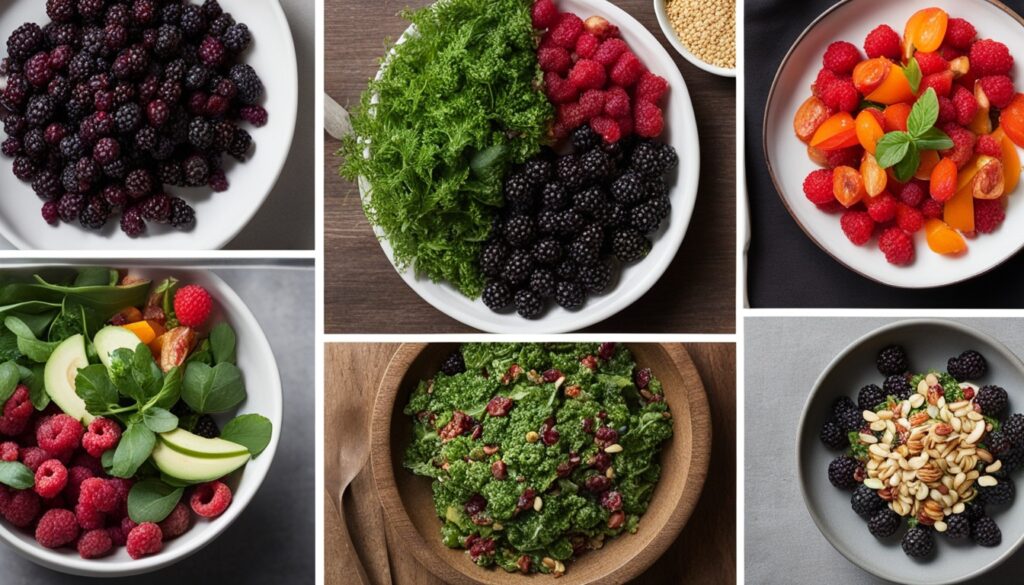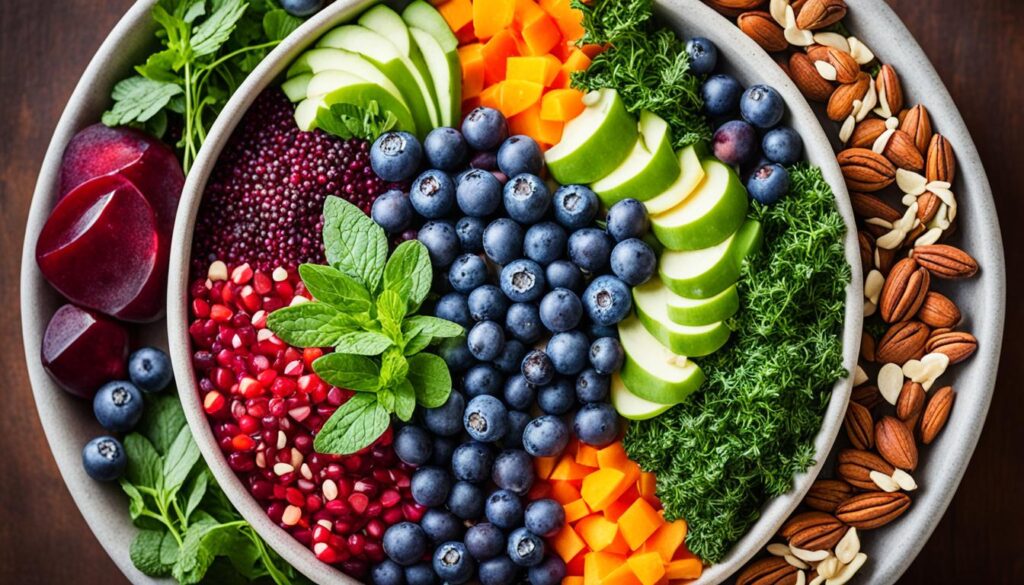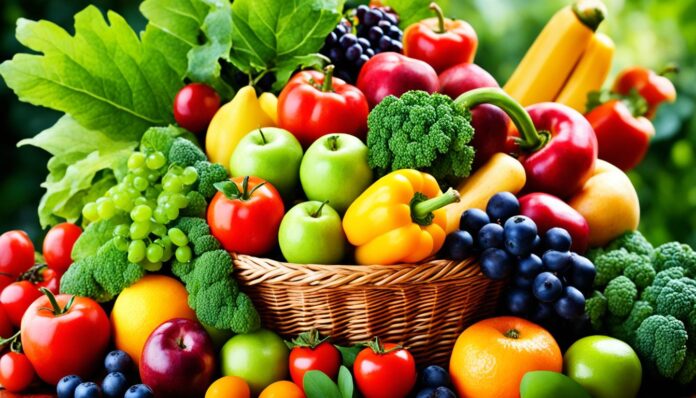Are you looking to boost your nutrition and overall health? Incorporating nutrient-dense superfoods into your diet could be the answer. But with so many options, how do you know which ones to choose? In this article, we’ll explore the top 5 nutrient-dense superfoods that should be on your radar.
Key Takeaways
- Nutrient-dense superfoods are packed with essential vitamins, minerals, and antioxidants.
- Adding these superfoods to your diet can provide a range of health benefits, from improved heart health to better cognitive function.
- The top 5 nutrient-dense superfoods to incorporate into your diet include salmon, kale, blueberries, avocados, and quinoa.
- Consuming a variety of nutrient-rich foods is the key to a balanced, healthy diet.
- Sustainability and environmental impact are important considerations when choosing superfoods.
What Are Nutrient-Dense Superfoods?
Nutrient-dense superfoods are foods that are exceptionally rich in essential vitamins, minerals, antioxidants, and other beneficial plant compounds. These powerhouse foods provide a concentrated dose of nutrition, often with fewer calories than their less nutrient-rich counterparts. Incorporating nutrient-dense superfoods into your diet can support optimal health, boost energy levels, and reduce the risk of chronic diseases.
Salmon: A Powerhouse of Omega-3s
Salmon is a true superfood, providing a wealth of essential nutrients. A 100-gram serving of wild Atlantic salmon contains about 2.2 grams (g) of omega-3s and 25.4 g of high-quality animal protein1. Omega-3 fatty acids are known for their heart-healthy properties, and salmon is one of the best sources. Additionally, salmon is rich in vitamins B12, D, and selenium, all of which are crucial for maintaining overall health.
Salmon’s Nutritional Profile
Salmon is a nutrient-dense fish that offers a host of health benefits. It’s an excellent source of high-quality protein, providing all the essential amino acids necessary for muscle growth and repair. Salmon is also packed with omega-3 fatty acids, which have been shown to reduce inflammation, lower blood pressure, and improve heart health1. Additionally, this superfood is rich in vitamins B12, D, and several minerals, including selenium, which supports a healthy immune system and thyroid function.
Kale: The King of Greens
Kale is a leafy green powerhouse, earning its title as the “king of greens.” One cup of kale has only 9 calories and is rich in vitamins C, A, K, and B6, as well as potassium, calcium, magnesium, and other essential minerals1. Kale is also an excellent source of antioxidants, which can help protect your cells from damage and reduce the risk of chronic diseases.
Top 5 Nutrient-Dense Superfoods You Should Add to Your Diet
Incorporating nutrient-dense superfoods into your diet is an excellent way to boost your overall health and well-being. From salmon’s heart-healthy omega-3s to kale’s impressive nutrient profile, these powerhouse foods can provide a wealth of benefits. As you explore the top 5 nutrient-dense superfoods, remember that the key to a healthy diet is variety. By adding a mix of these superfoods to your meals, you’ll be well on your way to optimizing your nutrition and living your best life.
Blueberries: Tiny but Mighty
Don’t let their small size fool you – blueberries pack a mighty nutritional punch. These little berries are rich in antioxidants, which may have neuroprotective functions, enhance endothelial function, and inhibit cancer cell growth1. Blueberries are also a good source of fiber, vitamins C and K, and manganese, making them a superfood worth adding to your diet.
Blueberries’ Antioxidant Power
Blueberries are renowned for their high antioxidant content, which is attributed to their rich pigments called anthocyanins2. These antioxidants can help reduce oxidative stress, fight inflammation, and protect against various diseases, including diabetes, heart disease, and Alzheimer’s2. Incorporating blueberries into your diet can be an effective way to boost your overall health and well-being.
Avocados: A Superfood for Heart Health
Avocados are a nutrient-dense superfood that offer a wide range of health benefits. They are a great source of healthy monounsaturated fats, providing 29 milligrams (mg) of magnesium per ½ fruit, which is about 7% of the daily value2. Avocados have also been shown to have potential in preventing cardiovascular disease, making them a valuable addition to a heart-healthy diet.
Quinoa: The Versatile Ancient Grain
Quinoa is an ancient grain that has gained superstar status in recent years, and for good reason. This nutrient-dense superfood is packed with protein, fiber, and a host of essential vitamins and minerals. Quinoa is a complete protein, containing all the essential amino acids necessary for cell production and repair3. It’s also high in flavonoids, magnesium, and other beneficial compounds that support heart health, blood sugar regulation, and a healthy gut.
Quinoa’s Nutritional Advantages
Quinoa is a highly nutritious ancient grain that offers a range of health benefits. It is a complete protein, meaning it contains all the essential amino acids that our bodies cannot produce on their own3. Quinoa is also rich in fiber, magnesium, and various vitamins and minerals, making it a valuable addition to a balanced, nutrient-rich diet. Incorporating quinoa into your meals can support heart health, blood sugar regulation, and overall digestive function3.
Incorporating Superfoods into Your Diet
Adding nutrient-dense superfoods to your diet doesn’t have to be complicated. Start by incorporating them into your meals and snacks in simple, delicious ways. Try mixing kale into a salad, topping your avocado toast with salmon, or blending blueberries into a smoothie. Experiment with different recipes and flavor combinations to find what works best for you and your taste preferences.
The Benefits of a Nutrient-Rich Diet
Adopting a diet rich in nutrient-dense superfoods can provide a wide range of health benefits. These powerhouse foods can support heart health, boost cognitive function, enhance immunity, and even reduce the risk of chronic diseases like cancer and Alzheimer’s. By making nutrient-rich choices, you’ll be nourishing your body with the essential vitamins, minerals, and antioxidants it needs to thrive.
Superfoods and Sustainability
As you explore the world of nutrient-dense superfoods, it’s important to consider the environmental impact of your food choices. Look for sustainable and ethically sourced options, such as wild-caught salmon or organically grown produce. By prioritizing sustainability, you can enjoy the health benefits of superfoods while also supporting a more environmentally-friendly food system.
Embracing a Superfood Lifestyle
Incorporating nutrient-dense superfoods into your diet is a simple yet powerful way to optimize your health and well-being. By making these powerhouse foods a regular part of your meals and snacks, you’ll be providing your body with the essential nutrients it needs to thrive. So, why not start exploring the top 5 nutrient-dense superfoods and see how they can transform your health and quality of life?
Superfoods and Overall Health
Nutrient-dense superfoods don’t just provide a wealth of essential vitamins and minerals; they can also play a key role in supporting overall health and well-being. From improving heart health to boosting cognitive function, these powerful foods can have a profound impact on your physical and mental state. By making superfoods a regular part of your diet, you’ll be nourishing your body and mind, setting the stage for a healthier, more vibrant life.
Conclusion
Incorporating nutrient-dense superfoods into your diet is a simple yet powerful way to optimize your health and well-being. By exploring the top 5 superfoods, including salmon, kale, blueberries, avocados, and quinoa, you’ll be providing your body with a concentrated dose of essential vitamins, minerals, and antioxidants. Remember to consider sustainability and environmental impact when choosing your superfoods, and strive to create a varied, nutrient-rich diet that supports your overall health and quality of life.
What Are Nutrient-Dense Superfoods?
Nutrient-dense superfoods are a category of foods that are packed with an impressive concentration of essential vitamins, minerals, and other beneficial plant compounds4. These nutrient-rich foods provide a significant amount of critical nutrients relative to their calorie content, making them a powerful addition to any healthy diet.
Superfoods are often considered the nutritional MVPs, as they deliver an impressive array of antioxidants, fiber, healthy fats, and other vital nutrients that can support overall health and well-being5. By incorporating more of these nutrient-dense superfoods into your daily meals and snacks, you can ensure your body is getting the nourishment it needs to thrive.
From leafy greens like kale and spinach to antioxidant-rich berries, omega-3-packed fish, and fiber-filled beans, the world of superfoods offers a wide variety of options to explore5. These nutrient-dense powerhouses can help boost immune function, support heart health, improve gut health, and even enhance cognitive function.
Superfoods are not just about the individual nutrients they contain; it’s the synergistic effect of these various compounds that make them so beneficial6. For example, avocados not only provide a wealth of vitamins and minerals but can also enhance the absorption of other nutrients in the meals they’re consumed with.
Incorporating more nutrient-dense superfoods into your diet can be a simple and effective way to support your overall health and well-being. Whether you’re looking to boost your energy levels, support heart health, or simply ensure you’re getting a wide range of essential nutrients, these superfoods can be a game-changer.
Salmon: A Powerhouse of Omega-3s
Salmon is a true superfood, packed with an abundance of essential nutrients that can benefit your health in remarkable ways. At the forefront of salmon’s remarkable nutritional profile are its high levels of omega-3 fatty acids, particularly EPA (eicosapentaenoic acid) and DHA (docosahexaenoic acid)7. These omega-3s are crucial for maintaining a healthy heart, brain function, and reducing inflammation throughout the body7. Regular consumption of salmon can contribute to better overall cardiovascular health and support a sharp mind7.
Salmon’s Nutritional Profile
A 100-gram serving of wild Atlantic salmon contains approximately 2.2 grams of omega-3 fatty acids, along with 25.4 grams of high-quality animal protein8. Salmon is also an excellent source of essential vitamins and minerals, including magnesium, potassium, selenium, and B vitamins8. The combination of omega-3s, protein, and other vital nutrients make salmon a true nutrient powerhouse that can support overall health and well-being7.
Numerous studies have highlighted the remarkable benefits of incorporating salmon into your diet9. The American Journal of Clinical Nutrition suggests that the omega-3 fatty acids in salmon may help reduce inflammation and improve skin health9. Additionally, the European Journal of Nutrition notes that salmon’s omega-3s can contribute to improved cognitive function and a reduced risk of heart disease7.
Salmon’s versatility in the kitchen makes it an easy addition to any healthy diet. Whether grilled, baked, or incorporated into salads and pasta dishes, salmon’s rich, satisfying flavor and impressive nutrient profile make it a true superfood that should be a staple in your meal planning879.
Kale: The King of Greens
Kale, a leafy green powerhouse, has rightfully earned the title of “the king of greens.”10 This nutrient-dense superfood is brimming with an array of vitamins, minerals, and antioxidants that make it a standout addition to any healthy diet11.
A single cup of raw kale (21g) packs an impressive nutritional punch, containing just 7 calories, 1g of carbs, and 1g of fiber10. But the real star power lies in its abundance of essential vitamins and minerals, with 68% of the Daily Value (DV) for vitamin K, 22% of the DV for vitamin C, and smaller but still significant amounts of manganese, vitamin A, riboflavin, and calcium10. Kale is also a rich source of folate, vitamin B6, potassium, magnesium, and iron10.
The benefits of incorporating kale into your diet are numerous. Studies have shown that consuming just 14g of kale powder daily for 8 weeks can significantly reduce LDL cholesterol levels, blood pressure, belly fat, and fasting blood sugar levels10. Additionally, steamed kale is 13% as potent as cholestyramine, a prescription medication used to lower cholesterol10. Kale’s nutrient profile also includes compounds like sulforaphane and indole-3-carbinol, which have been linked to protective effects against cancer10.
Beyond its impressive nutritional value, kale is also a powerhouse for eye health, thanks to its high concentrations of lutein and zeaxanthin10. And for those looking to maintain a healthy weight, the low-calorie, high-bulk nature of kale makes it an excellent choice for weight management10.
Whether you enjoy it raw, sautéed, or in a smoothie, incorporating more kale into your diet is a simple yet impactful step towards a healthier, more nutrient-rich lifestyle11. As the “king of greens,” kale truly is a superfood worth adding to your culinary repertoire.
Top 5 Nutrient-Dense Superfoods You Should Add to Your Diet
When it comes to optimizing your health, incorporating nutrient-dense superfoods into your diet is a game-changer. These top 5 superfoods are packed with essential vitamins, minerals, antioxidants, and other beneficial compounds that can support overall well-being12.
- Salmon – This oily fish is a rich source of heart-healthy omega-3 fatty acids, high-quality protein, B vitamins, and antioxidants like astaxanthin1314.
- Kale – Often referred to as the “king of greens,” kale is a nutrient-dense leafy green that boasts vitamins A, C, and K, as well as a variety of beneficial plant compounds12.
- Blueberries – These tiny berries are powerhouses of antioxidants, phytochemicals, vitamins C and K, and manganese1314.
- Avocados – Avocados are a rich source of heart-healthy monounsaturated fats, as well as vitamins C, E, K, and folate1314.
- Quinoa – This ancient grain is a complete protein, providing all the essential amino acids, and is also a good source of fiber, B vitamins, and minerals1412.
Incorporating these top nutrient-dense superfoods into your diet can provide a significant boost to your overall health and well-being12.

| Superfood | Key Nutrients | Health Benefits |
|---|---|---|
| Salmon | Omega-3 fatty acids, protein, B vitamins, potassium, selenium, antioxidants | Heart health, brain function, joint support |
| Kale | Vitamins A, C, K, fiber, phytonutrients | Immune support, bone health, antioxidant protection |
| Blueberries | Antioxidants, phytochemicals, vitamins C and K, manganese | Brain health, reduced inflammation, improved immunity |
| Avocados | Monounsaturated fats, vitamins C, E, K, folate | Heart health, skin health, nutrient absorption |
| Quinoa | Complete protein, fiber, B vitamins, minerals | Stable energy, weight management, digestive health |
Incorporating these top nutrient-dense superfoods into your diet can provide a significant boost to your overall health and well-being12.
Blueberries: Tiny but Mighty
Blueberries are small, unassuming fruits that pack a powerful nutritional punch. These tiny berries are renowned for their exceptional antioxidant content, which can offer a wide range of potential health benefits15.
Blueberries’ Antioxidant Power
One of the standout features of blueberries is their high concentration of antioxidants, particularly anthocyanins and other polyphenols. These compounds are believed to have a neuroprotective function, potentially aiding in brain health and cognitive function15. Research suggests that blueberries may help improve thinking, mood, and endothelial function, which is crucial for maintaining healthy blood flow15. Additionally, some studies indicate that blueberries may possess anti-cancer properties by inhibiting the growth of cancer cells15.
A 1-cup serving of blueberries (148 grams) contains 3.6 grams of fiber, 16% of the Daily Value (DV) of Vitamin C, 24% of the DV of Vitamin K, and 22% of the DV of Manganese15. Blueberries are approximately 85% water and contain only 84 calories per cup, with 21.5 grams of carbohydrates15.
The antioxidant power of blueberries has been linked to numerous potential health benefits. A 2-ounce (50-gram) serving of freeze-dried blueberries reduced LDL cholesterol oxidation by 28% over 8 weeks in individuals with obesity15. Consuming 2 ounces (50 grams) of freeze-dried blueberries per day led to a 4%–6% reduction in blood pressure in individuals with obesity over an 8-week study15. Regular blueberry intake has also been associated with lower blood pressure, particularly in postmenopausal women15.
The antioxidant properties of blueberries may extend to cognitive function as well. Blueberry juice consumption in older adults with mild cognitive impairment resulted in improvements in several markers of brain function over 12 weeks15. Furthermore, blueberries and strawberries were linked to delays in mental aging by up to 2.5 years in a 6-year study with over 16,000 older individuals15.
Blueberries also appear to have anti-diabetes effects, improving insulin sensitivity and lowering blood sugar levels15. In a study with 32 obese individuals with insulin resistance, two blueberry smoothies daily significantly improved insulin sensitivity15. Additionally, blueberries may aid in muscle recovery after strenuous exercise, potentially reducing muscle soreness and enhancing muscle performance15.
The impressive nutritional profile and potent antioxidant properties of blueberries make them a true superfood that deserves a prominent place in a balanced, nutrient-rich diet15. Whether enjoyed fresh, frozen, or in juices and smoothies, incorporating blueberries into your daily routine can provide a wealth of potential health benefits151617.
Avocados: A Superfood for Heart Health
Avocados are more than just a key component of the trendy avocado toast – they are a true superfood that packs a punch when it comes to heart health. Boasting an impressive nutritional profile, avocados are a rich source of heart-healthy fats, fiber, and an array of essential vitamins and minerals181920.
One of the standout features of avocados is their high potassium content. In fact, a single avocado provides a whopping 975 milligrams of potassium, which is about 28% of the recommended daily intake18. Potassium plays a crucial role in regulating blood pressure and supporting overall cardiovascular function.
Avocados are also brimming with heart-healthy monounsaturated and polyunsaturated fats. These fats have been shown to help lower cholesterol levels and reduce the risk of heart disease19. Furthermore, avocados contain plant sterols, such as beta-sitosterol, which can help maintain healthy cholesterol levels19.
But the benefits of avocados don’t stop there. These creamy fruits are also an excellent source of fiber, with a single serving providing 6.8 grams, or 24% of the daily recommended intake19. Fiber is essential for supporting digestive health and reducing the risk of heart disease.
Avocados are also packed with a variety of other essential vitamins and minerals, including folate, vitamin K, and vitamin C20. These nutrients play crucial roles in supporting overall health and well-being, from promoting healthy blood clotting to boosting the immune system.
Incorporating avocados into your diet is a simple and delicious way to support your heart health. Whether you enjoy them in a salad, on toast, or as a healthy snack, these nutrient-dense superfoods are a versatile and heart-friendly addition to any well-balanced diet.

So, if you’re looking to give your heart a little extra love, reach for an avocado and enjoy the many benefits this superfood has to offer. Your cardiovascular system will thank you!
Quinoa: The Versatile Ancient Grain
Quinoa’s Nutritional Advantages
Quinoa, an ancient grain largely unchanged over centuries, is a superfood packed with essential nutrients21. Quinoa contains 222 calories per 1 cup (185 grams) of cooked quinoa, with 8 grams of protein and 5 grams of fiber per serving21. It is also a good source of folate, providing 19% of the daily value (DV), and contains 39% of the DV for copper21. Additionally, quinoa offers magnesium (28% DV), zinc (18% DV), iron (15% DV), and manganese (51% DV)21.
Quinoa’s nutritional profile extends beyond essential vitamins and minerals22. It is rich in flavonoids like quercetin and kaempferol, which act as antioxidants and anti-inflammatory agents22. Compared to brown rice, quinoa contains more fiber, making it a better choice for digestive health21. Moreover, quinoa is naturally gluten-free, making it a safe and nutritious alternative for people with gluten intolerance21.
The versatility of quinoa is another key advantage21. Quinoa is easy to incorporate into diets and can be paired with a variety of foods for a delicious meal option23. Quinoa is recognized as a “super crop” due to its resilience to grow in different climates, being resistant to hypersalinity and drought23.
With its exceptional nutritional profile, quinoa is a superfood worth adding to a healthy diet212223.
Incorporating Superfoods into Your Diet
Incorporating more nutrient-dense superfoods into your daily diet is an excellent way to boost your overall health and well-being. From salmon to kale, blueberries to quinoa, there are countless delicious and easy-to-prepare options to choose from. Let’s explore some simple ways to add these powerful foods to your meals and snacks.
For salmon, you can bake it, grill it, or add it to salads and tacos24. Kale can be blended into smoothies, tossed into soups, or massaged with a bit of olive oil and lemon juice for a nutrient-packed salad24. Blueberries make a great snack on their own or can be added to yogurt, oatmeal, and baked goods24.
Avocados are incredibly versatile and can be used to make delicious guacamole, topping for toast, or blended into creamy smoothies24. Quinoa is a fantastic base for hearty bowls, a flavorful addition to casseroles, or a nutritious substitute for rice24.
Getting creative with superfood-packed recipes is an excellent way to boost your daily nutrient intake. From salmon burgers and kale chips to blueberry smoothie bowls and quinoa-stuffed avocados, the possibilities are endless. Incorporating these nutrient-dense superfoods into your meals and snacks can help you feel energized, support your overall health, and satisfy your taste buds.

Remember, the key to a balanced, nutrient-rich diet is variety. Aim to include a mix of different superfoods throughout the week to ensure you’re getting a wide range of essential vitamins, minerals, and antioxidants. With a little bit of creativity and experimentation, you can easily find ways to make superfoods a delicious and integral part of your daily routine.
The Benefits of a Nutrient-Rich Diet
Incorporating a diet rich in nutrient-dense superfoods can provide a wide range of health benefits. These benefits include improved heart health, better brain function, stronger immunity, reduced inflammation, and a lower risk of chronic diseases like cancer and diabetes25. Superfoods are packed with essential vitamins, minerals, fiber, healthy fats, and antioxidants that work synergistically to support overall wellness25.
Consuming nutrient-dense superfoods can lead to remarkable improvements in various aspects of health. Berries, such as raspberries, blueberries, strawberries, blackberries, and huckleberries, are associated with improving heart health and relieving anxiety25. Nuts consumed regularly can reduce inflammation, improve artery health, decrease the risk of high blood pressure, lower unhealthy cholesterol levels, and decrease the risk of blood clots25.
Moreover, olive oil, specifically extra-virgin olive oil, can lower premature death rates from heart disease, Alzheimer’s disease, respiratory disease, and other causes with just half a tablespoon daily25. Salmon consumption can boost mental health, improve sleep, and lower the risk of heart disease due to its rich content of protein, selenium, phosphorus, B vitamins, and omega-3 fatty acids25.
Dark chocolate, containing iron, magnesium, zinc, copper, and phosphorus, has minerals beneficial for immunity support, maintaining healthy bones and teeth, and contributing to improved sleep quality25. Legumes, like beans, lentils, and peas, are rich sources of fiber, protein, and iron, which help maintain blood pressure levels25. Avocados, being nutrient-dense fruits, may assist in reducing inflammation and lowering the risk of chronic diseases by providing fruit fiber that can lower the risk of conditions like stroke, diabetes, obesity, hypertension, and some gastrointestinal diseases25.
The importance of a nutrient-rich diet is further underscored by the fact that2665% of Americans include superfoods in their daily diet, and the global superfoods market value is expected to increase by 36% from 2019 to 202526. Incorporating more of these nutrient powerhouses into your daily meals and snacks can help ensure you’re meeting your body’s nutritional needs to thrive.
“Eating a diet rich in nutrient-dense foods can have a profound impact on your overall health and well-being. By making simple swaps and incorporating more superfoods into your meals, you can unlock a world of benefits, from improved heart health to better cognitive function and a stronger immune system.”
As the research suggests, the standard American diet is often energy-rich and nutrient-poor27. By focusing on nutrient-dense and heart-healthy dietary patterns, individuals can improve their overall health and reduce the risk of chronic diseases27. The Heart-Check mark can help consumers identify products that align with these healthy eating patterns27.
Making simple swaps in recipes and snacking choices can significantly boost the nutrient density of your diet27. For instance, substituting unsalted nuts for chips and sweet fruits for candy can enhance your nutrient intake without excessive calorie consumption27. This focus on nutrient-dense foods allows for beneficial nutrient intake without compromising your overall health27.
Superfoods and Sustainability
When it comes to embracing a healthier lifestyle, the concept of sustainability is just as important as the nutritional value of the foods we consume. Fortunately, many of the top nutrient-dense superfoods are also eco-friendly choices that have a minimal environmental impact28.
Wild-caught salmon, for instance, is a sustainable seafood option that comes from well-managed fisheries29. Leafy greens like kale are relatively easy to grow and have a low carbon footprint, making them a sustainable superfood pick28. Blueberries and quinoa are also considered sustainable crops, as they can be produced in a way that conserves natural resources29.
By selecting superfoods that are not only nutritious but also environmentally friendly, you can make a positive impact on both your personal health and the planet. Incorporating sustainable superfoods into your diet is a win-win, allowing you to enjoy the benefits of nutrient-dense foods while also supporting eco-friendly agricultural practices28.
| Superfood | Environmental Impact | Sustainability Factor |
|---|---|---|
| Salmon | Wild-caught from well-managed fisheries | High |
| Kale | Easy to grow, low carbon footprint | High |
| Blueberries | Sustainable crop production | High |
| Quinoa | Sustainable crop production | High |
By choosing eco-friendly, nutrient-dense superfoods, you can enjoy the multiple benefits of a sustainable, healthy diet29. These superfood choices not only nourish your body but also support environmental conservation efforts, making them an excellent addition to any lifestyle focused on overall well-being28.
“Eating sustainably doesn’t mean sacrificing taste or nutrition. In fact, many of the most nutrient-dense superfoods are also environmentally friendly choices.” – Registered Dietitian Nutritionist
Embracing a Superfood Lifestyle
Adopting a superfood lifestyle involves making nutrient-dense foods a regular part of your diet and daily routine. This means not only incorporating the top superfoods like salmon, kale, blueberries, avocados, and quinoa, but also exploring a wide variety of other nutrient-dense fruits, vegetables, whole grains, and lean proteins. A superfood lifestyle is about nourishing your body with the essential vitamins, minerals, and plant compounds it needs to thrive30. By making superfoods a priority, you can support your overall health and well-being for the long term.
One of the key benefits of embracing a superfood lifestyle is the abundance of essential nutrients these foods provide. Leafy greens like kale offer an astounding 680 percent of your daily value of vitamin K30. Berries, such as acai, are rich in antioxidants and contain 19 amino acids30. Blueberries may even assist in reducing the risk of urinary tract infections due to a particular flavonoid they contain30. Almonds are shown to help prevent heart disease and decrease levels of bad cholesterol (LDL)30. Salmon, a true superfood, is rich in omega-3s, protein, healthy fats, selenium, phosphorus, and B vitamins, benefiting red blood cell production and central nervous system health30.
Beyond the top-tier superfoods, a superfood lifestyle encourages exploring a diverse range of nutrient-dense foods. Quinoa, for instance, is a complete protein source containing all nine essential amino acids, making it an excellent inclusion for vegetarian and vegan diets31. Spinach is a powerhouse of vitamins A, C, and K, along with essential minerals like iron, calcium, and magnesium31. Blueberries are high in antioxidants, fiber, and vitamins, supporting heart health and cognitive function31. Chia seeds are packed with omega-3 fatty acids, antioxidants, fiber, protein, calcium, and various minerals, proving beneficial for cardiovascular health, blood sugar levels, and weight management31.
Embracing a superfood lifestyle also means recognizing the broader health benefits these nutrient-dense foods can provide. Avocados are recognized for their anti-inflammatory properties due to their high content of heart-healthy monounsaturated fats32. Berries, rich in anthocyanins, have shown promising potential in reducing systemic inflammation, a key factor in the development of chronic diseases such as cardiovascular disease, Alzheimer’s, and type 2 diabetes32. Cruciferous vegetables, containing sulfur compounds like glucosinolates, are associated with a reduced risk of cancer due to their various anticancer mechanisms32. Lemons are known for their wide-ranging health benefits, including anti-inflammatory, antimicrobial, and anticancer properties, supported by scientific research32. Ginger, with bioactive compounds like 6-shoagol and 8-shoagol, has demonstrated efficacy in reducing symptoms of inflammatory diseases such as arthritis and lupus, and easing chemotherapy-related nausea32.
By embracing a superfood lifestyle, you can unlock a world of healthy living and overall wellness. Nourish your body with nature’s most potent and beneficial foods, and embark on a journey towards a healthier, more vibrant you.
Superfoods and Overall Health
The nutrient-dense nature and diverse range of beneficial compounds found in superfoods make them powerful tools for supporting overall health and preventing chronic diseases33. The omega-3 fatty acids in salmon, the antioxidants in blueberries, the heart-healthy fats in avocados, and the fiber in quinoa all contribute to reduced inflammation, improved cardiovascular function, better brain health, and a lower risk of conditions like cancer, diabetes, and Alzheimer’s disease33.
Superfoods are becoming increasingly popular as people take charge of their health through dietary choices34. These nutrient-dense foods are packed with antioxidants, vitamins, and minerals that can boost immunity, enhance energy levels, and support gut health33. Regularly incorporating a variety of nutrient-dense superfoods into your diet can help ensure you’re providing your body with the essential nutrients it needs to thrive.
Studies indicate that the consumption of superfoods high in antioxidants and flavonoids can help prevent coronary heart disease, cancer, improve immunity, and reduce inflammation35. Superfoods like citrus fruits, dark leafy greens, and fermented foods are rich in these beneficial compounds, making them powerful allies in the pursuit of overall health and wellness3334.
| Superfood | Key Nutrients and Health Benefits |
|---|---|
| Salmon | Omega-3 fatty acids for reduced inflammation, improved cardiovascular function, and brain health33. |
| Blueberries | Antioxidants for improved brain health, heart health, and gut health34. |
| Avocados | Heart-healthy fats for improved cardiovascular function and reduced risk of chronic diseases33. |
| Quinoa | Fiber for supporting gut health and regulating blood sugar levels33. |
| Kale | Vitamins A, K, and C, and calcium for supporting bone health and rich in antioxidants33. |
| Spinach | Vitamins A, K, folic acid, and iron for eye health, reduced oxidative stress, and heart health support3335. |
By incorporating a variety of nutrient-dense superfoods into your diet, you can take a proactive approach to maintaining overall health and well-being333435. Whether you choose to add salmon, blueberries, avocados, quinoa, or leafy greens to your meals, you’ll be providing your body with the essential nutrients it needs to thrive and reducing your risk of chronic diseases.
“Superfoods are nutrient-dense foods that contain antioxidants, vitamins, and minerals. They are recognized for their potential health benefits and overall wellness.”33
Conclusion
The top nutrient-dense superfoods – salmon, kale, blueberries, avocados, and quinoa – are powerhouses of essential vitamins, minerals, healthy fats, fiber, and antioxidants36. Incorporating more of these nutrient-rich foods into your daily diet can provide a wealth of health benefits, from supporting heart health and brain function to boosting the immune system and reducing the risk of chronic diseases37. Whether your goal is to improve overall wellness or address specific health concerns, making superfoods a priority is a simple and delicious way to nourish your body with the essential nutrients it needs to thrive28.
By embracing a superfood lifestyle, you can unlock the full potential of a nutrient-rich diet36. These remarkable superfoods not only deliver exceptional nutritional value but also contribute to long-term well-being, making them a smart choice for anyone seeking to optimize their health and wellness37. As you continue your journey towards a more nutrient-dense diet, explore new ways to incorporate these superfood powerhouses into your meals and snacks, and experience the transformative benefits they can bring to your overall health and vitality28.
In conclusion, the top nutrient-dense superfoods discussed in this article offer a wealth of opportunities to enhance your diet and support your long-term health and well-being36. By making these superfoods a regular part of your lifestyle, you can nourish your body, boost your energy levels, and take proactive steps towards a healthier, more vibrant future37. Embrace the power of superfoods and unlock the benefits of a nutrient-rich diet today28.
FAQ
What are nutrient-dense superfoods?
Nutrient-dense superfoods are foods that are packed with a high concentration of vitamins, minerals, and other beneficial plant compounds. These foods provide a significant amount of essential nutrients relative to their calorie content.
What are the top 5 nutrient-dense superfoods?
The top 5 nutrient-dense superfoods you should add to your diet are salmon, kale, blueberries, avocados, and quinoa.
What are the benefits of consuming salmon?
Salmon is high in omega-3 fatty acids, which are essential nutrients needed for the correct functioning of the brain, eyes, heart, blood vessels, lungs, immune system, and endocrine system. Salmon is also a great source of high-quality animal protein, vitamins, and minerals.
Why is kale considered a nutrient-dense superfood?
Kale is a green, leafy vegetable that’s rich in vitamins, minerals, fiber, antioxidants, and various bioactive compounds. It provides large amounts of vitamins C, A, K, and B6, as well as potassium, calcium, magnesium, copper, and manganese.
What are the health benefits of blueberries?
Blueberries are an excellent source of antioxidants, including anthocyanins and other polyphenols. Research suggests these compounds may have neuroprotective effects, improve endothelial function, and inhibit the growth of cancer cells.
How are avocados a superfood for heart health?
Avocados are a good source of heart-healthy monounsaturated and polyunsaturated fats, as well as fiber and the mineral magnesium. Replacing saturated fats with the fats found in avocados can help reduce the risk of heart disease.
Why is quinoa considered an ancient superfood grain?
Quinoa is an ancient grain that provides more nutrients and fiber compared to white rice. It contains a variety of phenolic acids with antioxidant properties that may help prevent conditions like type 2 diabetes, cancer, and heart disease.
How can I incorporate more superfoods into my diet?
There are many easy and delicious ways to add superfoods to your meals and snacks, such as baking or grilling salmon, adding kale to smoothies and salads, topping toast with avocado, and using quinoa as a base for bowls and casseroles.
What are the overall health benefits of a nutrient-dense superfood diet?
Consuming a diet rich in nutrient-dense superfoods can provide a wide range of health benefits, including improved heart health, better brain function, stronger immunity, reduced inflammation, and a lower risk of chronic diseases like cancer and diabetes.
Source Links
- 12 Of The Most Nutrient-Dense Foods You Can Eat
- 15 of the Most Powerful Superfoods
- 10 Trending Superfoods That Are Packed With Health Benefits
- 14 Superfoods To Consider Adding To Your Diet, According To Experts
- 10 Nutrient-Dense Foods to Supercharge Your Health | Advanced Diabetes Supply®
- What are the Best Superfoods? – Most Nutrient Dense Top 6
- Unveiling the Top 5 Superfoods for a Nutrient-rich Diet
- Superfoods You Should Be Eating, According to Dietitians – WTOP News
- Omega-3s for the Win: 5 Superfoods for Healthy Skin in Manteca — MAS’OOD CAJEE, DDS, MPH
- 9 Health Benefits of Kale
- Superfoods: Worth all the Hype? – The Lifestyle Dietitian
- Are You Eating The Top Superfoods? | Fountain Hills Medical Center
- SelectHealth
- 10 great health foods
- 10 Proven Health Benefits of Blueberries
- The top 10 superfoods for brain health, weight loss and more
- 5 Superfoods for a New and Improved You!
- 10 Super Foods Good for Your Heart
- 12 health benefits of avocado
- Superfoods: The Avocado – Emory | Healthy Aging Study
- Quinoa: Nutrition Facts and Health Benefits
- What Is Quinoa? One of The World’s Healthiest Foods
- Eat More Quinoa: The Benefits of This Ancient Grain (Plus Recipes!)
- Top 5 superfoods to add to your diet – Healthedly Insurance Services
- 9 superfoods with physical and mental health benefits to incorporate into your diet ASAP
- Superfoods for Super Health: the Power of Nutrition
- How Can I Eat More Nutrient-Dense Foods?
- 16 Superfoods That Are Worthy of the Title
- Top 10 Superfoods of 2024, According to Registered Dietitians
- 5 Superfoods You Should Incorporate into Your Diet
- Top 5 Nutrient-Dense Superfoods in SoCal Fresh Meals
- Supercharge Your Health: Top 5 Superfoods for Optimal Well-being and Disease Prevention
- What Are Superfoods? The 10 Best Superfoods To Try | Myvegan
- 5 Powerful Superfoods to Add to Your Diet
- Superfoods: Health benefits, uses, and risks
- What are the most nutrient-dense foods in the world?
- Here Are 10 Must-Have Superfoods That Will Change Your Food Game!



